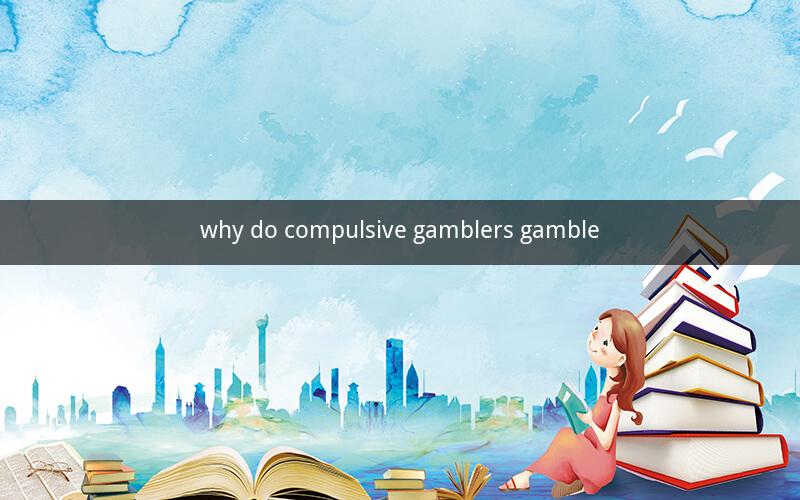
Directory
1. Introduction to Compulsive Gambling
2. The Psychology Behind Compulsive Gambling
3. Social and Economic Factors Influencing Compulsive Gambling
4. The Impact of Compulsive Gambling on Personal Life
5. The Role of Technology in Compulsive Gambling
6. Treatment and Support for Compulsive Gamblers
7. Conclusion
1. Introduction to Compulsive Gambling
Compulsive gambling, also known as gambling disorder, is a mental health condition characterized by an irresistible urge to gamble, regardless of the consequences. It affects individuals from all walks of life and can lead to significant financial, social, and emotional problems. Understanding the reasons behind compulsive gambling is crucial in addressing this issue effectively.
2. The Psychology Behind Compulsive Gambling
Several psychological factors contribute to the development of compulsive gambling. These include:
a. Dopamine Reward System
The brain's reward system plays a vital role in the development of compulsive gambling. When individuals engage in gambling activities, the brain releases dopamine, a neurotransmitter associated with pleasure and reward. This dopamine release reinforces the urge to gamble, leading to addictive behavior.
b. Impulse Control Disorders
Compulsive gamblers often struggle with impulse control disorders, which make it difficult to resist the urge to gamble. These disorders can be hereditary or acquired due to environmental factors.
c. Stress and Anxiety
Stress and anxiety can trigger gambling behavior in individuals. Compulsive gamblers may use gambling as a way to escape their problems or cope with negative emotions.
3. Social and Economic Factors Influencing Compulsive Gambling
Several social and economic factors can contribute to the development of compulsive gambling:
a. Accessibility to Gambling
The availability of gambling opportunities, such as casinos, online platforms, and sports betting, can increase the risk of developing compulsive gambling.
b. Financial Stress
Financial difficulties can push individuals to turn to gambling as a means to alleviate their problems or win money. However, this often exacerbates their financial situation.
c. Peer Influence
Peer pressure and the desire to fit in can lead individuals, especially adolescents and young adults, to engage in gambling activities.
4. The Impact of Compulsive Gambling on Personal Life
Compulsive gambling can have devastating consequences on an individual's personal life:
a. Financial Loss
Compulsive gamblers often suffer significant financial losses, leading to debt, foreclosure, and bankruptcy.
b. Relationships
Compulsive gambling can strain relationships with family, friends, and partners. Betrayal, lying, and emotional withdrawal are common consequences.
c. Mental Health
Compulsive gambling is often associated with other mental health issues, such as depression, anxiety, and substance abuse.
5. The Role of Technology in Compulsive Gambling
The rise of technology has made gambling more accessible and convenient, contributing to the increase in compulsive gambling cases:
a. Online Gambling
Online gambling platforms offer a wide range of games, making it easier for individuals to engage in gambling activities from the comfort of their homes.
b. Mobile Devices
Mobile devices have made gambling more portable, allowing individuals to gamble anytime, anywhere.
6. Treatment and Support for Compulsive Gamblers
Treating compulsive gambling involves a combination of therapy, medication, and support groups. Some common treatment approaches include:
a. Cognitive-Behavioral Therapy (CBT)
CBT helps individuals recognize and change negative thoughts and behaviors associated with gambling.
b. Support Groups
Support groups, such as Gamblers Anonymous, provide a platform for individuals to share their experiences and seek support from others who have faced similar challenges.
c. Medication
In some cases, medication may be prescribed to help manage symptoms of compulsive gambling.
7. Conclusion
Compulsive gambling is a complex issue influenced by various factors, including psychological, social, and economic factors. Understanding the reasons behind compulsive gambling is essential in developing effective prevention and treatment strategies. By addressing the underlying causes and providing support, we can help individuals overcome their gambling addiction and rebuild their lives.
---
Questions and Answers
1. Question: What is the primary neurotransmitter responsible for the pleasurable feeling associated with gambling?
Answer: Dopamine is the primary neurotransmitter responsible for the pleasurable feeling associated with gambling.
2. Question: How can financial stress contribute to the development of compulsive gambling?
Answer: Financial stress can push individuals to turn to gambling as a means to alleviate their problems or win money, leading to a potential escalation of gambling behavior.
3. Question: What are some common treatment approaches for compulsive gambling?
Answer: Common treatment approaches for compulsive gambling include cognitive-behavioral therapy (CBT), support groups, and medication.
4. Question: How can peer influence contribute to the development of compulsive gambling in adolescents?
Answer: Peer influence can lead adolescents to engage in gambling activities to fit in or impress their peers.
5. Question: What are the potential mental health issues associated with compulsive gambling?
Answer: Compulsive gambling can be associated with mental health issues such as depression, anxiety, and substance abuse.
6. Question: How has technology contributed to the increase in compulsive gambling cases?
Answer: Technology has made gambling more accessible and convenient, leading to an increase in compulsive gambling cases.
7. Question: What role does stress and anxiety play in the development of compulsive gambling?
Answer: Stress and anxiety can trigger gambling behavior in individuals, leading to a potential addiction.
8. Question: How can cognitive-behavioral therapy (CBT) help individuals with compulsive gambling?
Answer: CBT helps individuals recognize and change negative thoughts and behaviors associated with gambling.
9. Question: What is the significance of support groups in treating compulsive gambling?
Answer: Support groups provide a platform for individuals to share their experiences and seek support from others who have faced similar challenges.
10. Question: How can individuals overcome their gambling addiction?
Answer: Individuals can overcome their gambling addiction by addressing the underlying causes, seeking professional help, and engaging in support groups.